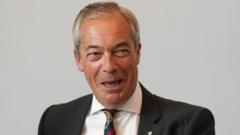Is Reform Shaping the Political Landscape?

Shifting Political Alliances: The Rise of Reform UK
In a surprising turn of events, Reform UK is making headlines once again as a wave of defection from the Conservative Party continues to reshape the political landscape in the UK. Notably, the recent addition of Sir Jake Berry, a former Conservative cabinet minister, has stirred conversations about the future of both the Conservative Party and the emergent Reform UK. As political loyalties shift and historical alliances crumble, understanding these dynamics is crucial for anyone keen on the current state of British politics.
Understanding the Defections
The political climate in the UK has been turbulent, especially with the increasing number of Conservative MPs defecting to Reform UK. David Jones, Anne Marie Morris, Ross Thomson, and now Sir Jake Berry—all former prominent members of the Conservative Party—have voiced their discontent, leading to significant speculation about the Conservative Party's future.
The Significance of Sir Jake Berry’s Defection
Sir Jake Berry is not just any defector; he is a seasoned politician with a remarkable history in the Conservative Party. Having served as the chairman of the Conservative Party and held positions in three different government departments, his departure is emblematic of a broader discontent within the party ranks. His statement regarding the last two decades of both Labour and Tory rule as detrimental to the nation encapsulates a growing frustration that resonates with many constituents.
The Current Political Landscape
As the political landscape evolves, Reform UK is gaining traction. Their strategy seems focused on capitalizing on the discontent among traditional Conservative voters. This shift raises questions about the traditional two-party system that has dominated British politics. With Reform UK increasingly viewed as a viable alternative, the implications could be profound.
Labour’s Response to Reform UK
Interestingly, Labour, which has historically viewed the Conservative Party as its primary adversary, is now redirecting its focus toward Reform UK. This shift signifies a recognition of Reform's rising influence. The Labour Party's strategy is rooted in the need to counteract the growing appeal of Reform, especially as they have shown impressive performances in opinion polls and recent local elections.
The Implications of Reform UK’s Rise
As Reform UK continues to attract former Conservative MPs, it raises essential questions about party loyalty and the future of Conservative ideology. The influx of new members, particularly those with significant political clout, suggests a reevaluation of political affiliations based on ideology rather than party loyalty.
Public Sentiment and Voter Dynamics
The defections from the Conservative Party are not merely personal choices; they reflect a broader sentiment among the electorate. Many voters are disillusioned with the current political offerings, seeking alternatives that resonate more closely with their values and concerns. As Reform UK gains momentum, the traditional boundaries of British politics are being tested.
The Future of the Conservative Party
The Conservative Party faces a pivotal moment. With Sir Jake Berry’s defection and the loss of other prominent figures, the party must address its internal challenges. Party leaders are attempting to maintain a positive narrative, suggesting that while they may be losing former MPs, they are retaining current ones. However, the reality on the ground tells a different story.
Strategies for Recovery
To regain its footing, the Conservative Party must adapt to the changing political landscape. This could involve:
- Reassessing Policy Directions: The party needs to revisit its policies, ensuring they align with the values and needs of its constituents.
- Engaging with Disenfranchised Voters: Reconnecting with voters who feel abandoned or ignored by current leadership is crucial.
- Strengthening Party Unity: Creating a united front within the party is essential to counteract the narrative of disarray.
Labour’s Journey Ahead
As Labour pivots its focus towards Reform UK, the party must prepare for the long haul. The road ahead will require strategic planning, robust campaigning, and a commitment to delivering on promises made to the electorate. The challenge is not just to defeat Reform UK but to provide a compelling alternative that resonates with voters.
Building a Stronger Labour Party
To effectively counter Reform UK, Labour may consider the following approaches:
- Highlighting Achievements: Communicating past successes and current initiatives can bolster public confidence in Labour’s ability to govern.
- Engaging with Grassroots Movements: Strengthening connections with community organizations and grassroots movements can enhance Labour's appeal.
- Innovating Policy Solutions: Developing innovative policies that directly address the concerns of voters will be crucial in establishing Labour as a viable alternative.
A New Political Era?
The defections from the Conservative Party and the rise of Reform UK signify a potential shift in British politics. As parties reevaluate their strategies and alignments, the landscape may see further changes in affiliations and voter loyalty. This evolving situation presents both challenges and opportunities for all political entities involved.
Conclusion: The Path Forward
The political dynamics in the UK are undoubtedly shifting, and both the Conservative and Labour parties must navigate this changing terrain carefully. With Reform UK gaining footholds and changing the conversation, the established parties must respond effectively if they wish to maintain their relevance. This moment in British politics invites us to reflect on the evolving nature of political allegiance and the potential for new political coalitions.
FAQs
What prompted the recent defections from the Conservative Party?
The recent defections appear to be driven by discontent with the party's direction and leadership, as expressed by former MPs who seek alternatives that better align with their values.
How is Reform UK positioning itself in the current political landscape?
Reform UK is positioning itself as a viable alternative to the traditional parties, attracting disillusioned voters and former Conservative MPs by critiquing both Labour and Tory governance.
What should the Conservative Party focus on to regain support?
To regain support, the Conservative Party should focus on reassessing its policies, engaging with disenfranchised voters, and fostering party unity while addressing internal challenges.
Why is Labour focusing on Reform UK instead of the Conservatives?
Labour is focusing on Reform UK due to its rising influence and popularity, recognizing the need to counteract the growing appeal of a party that is attracting former Conservative MPs.
The shifting political alliances within the UK are both fascinating and concerning. As parties reassess their strategies and voter bases, the coming months will be critical in shaping the future of British politics. Will traditional party lines hold, or will we see a new era of political engagement? #UKPolitics #ReformUK #PoliticalDefections
Published: 2025-07-10 04:44:04 | Category: technology



